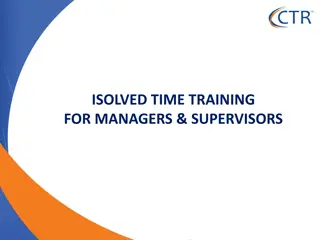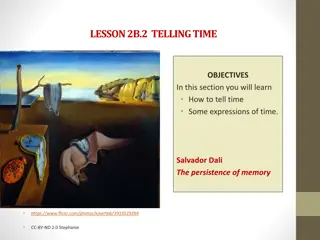
Effective Tips for Better Time Management in University Studies
Learn how to improve time management in university studies through goal setting, finding balance, and avoiding procrastination. Discover tools and strategies to enhance organization and productivity for academic success.
Download Presentation

Please find below an Image/Link to download the presentation.
The content on the website is provided AS IS for your information and personal use only. It may not be sold, licensed, or shared on other websites without obtaining consent from the author. If you encounter any issues during the download, it is possible that the publisher has removed the file from their server.
You are allowed to download the files provided on this website for personal or commercial use, subject to the condition that they are used lawfully. All files are the property of their respective owners.
The content on the website is provided AS IS for your information and personal use only. It may not be sold, licensed, or shared on other websites without obtaining consent from the author.
E N D
Presentation Transcript
Seminar Overview Most of us spend 80% of our time on trivial things, and use 20% of our time to accomplish everything important. How can we learn to be better organized? In this seminar, we ll discuss the importance of balancing the various aspects of your life as you make the transition to University studies. Specifically, the seminar will cover Goal Setting: long-term, mid-range, short-term Finding the Balance Time Management Tools Time Management Tips Take Home Points Time Management
Long-Term Goals: Plan with a Purpose Are you happy with the way you manage your time currently? Changing the way you do things means you recognize you could improve yourself. First, you want to establish your goals: What do you want out of life? What do you want out of your studies? It may take 4 to 20 years to achieve your Long Term Goals. Time Management
Mid-Range Goals: Looking Ahead What do you want to achieve this year? Are your goals attainable/realistic? Short-Term Goals: Breaking it Down What must happen/ be done for you to achieve these mid-range and long term goals? Taking care of today s details ensures you are preventing tomorrow s problems. Time Management
Finding the Balance One week = 168 hours 56 hours a week: sleeping 56 hours for academics 56 hours for life The big enemy to finding balance?PROCRASTINATION Time Management
Reasons Students Procrastinate Waiting for the right mood or right time Believing that best work is done under pressure Misjudging how long a task will take Feeling overwhelmed Misinterpreting/misunderstanding assignment Feeling shy about asking for help Any other ideas? Time Management
Time Management Tools Term Schedule Daily To Do List Fixed Weekly To Do List Commitment Schedule Time Management
Tool #1: Term Schedule Use course syllabus, and a different coloured marker for each course, to put this information on the calendar: All assignments All tests All exams use CAPITALS for exams or colour differently Time Management
Tool #2: Fixed Commitment Calendar Classes Meals Study Sleep Work (unless hours vary) Extra-curricular activities: sports, clubs, volunteering Time Management
How much time do you need to study? 2 hours of study for each hour in class. More difficult classes may need 3 or more hours of study for each hour in class. If you have 5 classes per term, you will spend at least 9 hours per week per class, equivalent to having more than a full time job A full schedule of 5 classes per term equals a minimum of 45 hours of study commitments per week. Time Management
Tool #3: Weekly To Do Lists On Sunday Night: List assignments due that week Every night check this list to see if you are on top of everything Time Management
Tool #4: Daily To Do Lists Each morning: Prioritize tasks A for high priority tasks B for medium priority tasks C for low priority tasks Add tasks left over from previous day Put academic goals at top of page Put personalgoals at bottom Check off completed tasks Time Management
Sample Daily To Do Lists Academic: History: Read text pp. 177-187 Sociology: Select essay topic Biology: Prepare study cards for Chapter 2 Psychology: Read text pp. 34-44 Statistics: Book tutoring session Personal: Go to Office of Student Awards & Financial Aid Do Laundry Time Management
Time Management Tips 80/20 Rule We spend 80% of our time on the trivial things. We spend 20% of our time on the vital things. Concentrate on the activities of value. Ask yourself: Is this the best use of my time right now? If it s not Time Management
The Power of 10 Overwhelmed? Anxious? Make a plan, break the task into steps, write them down and cross them off as you do them. Use academic supports such as the Writing Centre, see the GA for the class or the prof. Ask questions! Take control of your study environment. Find a spot that you associate with schoolwork Remove/tidy 10 things from your workspace The Swiss Cheese Approach 10 Minute Ticker use short periods of time to work away at the assignment Time Management
Time Management Take Home Points 1. 2. 3. Break large tasks into small, manageable chunks. 4. Schedule time to complete each study task, and build in breaks. 5. Tackle difficult courses first. 6. Learn to say no. Use a Do not Disturb sign. 7. Use the Swiss Cheese approach. 8. Concentrate! Give 100% of your attention to the task. Be realistic about how much time you have. Start assignments and papers as soon as you can. Time Management
References Academic Success Press Study Guides and Strategies. (1996) http://www.studygs.net/ Ban Blerkon, D. (2003) College Study Skills Fleet, J. et al (1999) Learning for Success Fry, R. (2000) How to Study Longman, D. Atkinson, R. (2002) College Learning and Study Skills Time Management
Thank you for your participation! http://ssc.lakeheadu.ca ssc@lakeheadu.ca 807-343-8018 SC 0008 Seminar content and handouts are available on our website under: Skills for Success Seminars Keep an eye out for posters advertising our upcoming events and seminars! Time Management

















